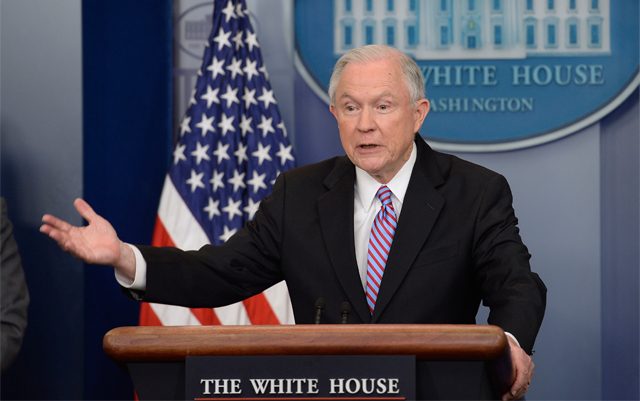Ever since the mere mention of the fact that Jeff Sessions may be picked for Attorney General, the cannabis industry has been on their toes waiting to see what will happen next with their shaky relationship with the federal government. Not long after Sessions was confirmed as Attorney General, White House press secretary Sean Spicer made an announcement that there would likely be more federal enforcement of marijuana in states with recreational cannabis – and went on to try and fabricate a link between cannabis legalization and the spreading of the opioid epidemic in the country.
Now Sessions has announced that the Task Force on Crime Reduction and Public Safety will be reviewing the Department of Justice’s current policies on many subjects – one of which is marijuana. They will be reviewing things such as charges and sentencing, as a part of their goal to reduce violent crime. Jeff Sessions claims that violent crime is an issue surrounding marijuana legalization, when really, the violence is found primarily in the illegal market. The biggest dangers in the legal market are due to the cash-only nature of the industry (an issue that federal reform could change entirely).
“So when we in the U.S. Attorney’s office, working with the DEA, looked at a marijuana case here in Colorado, we had to ask ourselves, ‘All right, we have to assume if we take this case to trial, seven out of 12 people sitting in the jury box are statistically likely to have voted for marijuana legalization.’ ” – Former U.S. Attorney John Walsh of Colorado
For many years now medical marijuana has been subject to issues when it comes to federal involvement – but Department of Justice memos acted to protect these businesses and the patients who rely on them. When states started legalizing recreational cannabis, the DOJ took a very hands-off approach, as described by former U.S. Attorney Walsh – focusing instead on more dangerous drug trafficking issues such as those involving methamphetamine, heroin and cocaine.
“If Jeff Sessions is looking for ways to make the Justice Department even more unpopular than it is right now, then you know go ahead and pick that battle over marijuana,” says Michael Collins, deputy director at the Drug Policy Alliance. “But it’s going to be a very unpopular fight and it’s going to be something that he receives a lot of blowback for.”
It certainly wouldn’t be the smartest move that the Trump Administration could make, to decide to enforce federal prohibition of cannabis – not when so many states, and even legislators, are working to end the same. Governors in four states that operate legal cannabis industries (Colorado, Washington, Oregon and Alaska) have asked Sessions to engage with them before making any changes to the current federal enforcement of cannabis – although who knows if this will actually happen. The task force is expected to have their findings to Sessions by the end of July, at which point we should finally have an idea of how the current administration is planning on handling marijuana law enforcement at the federal level.






